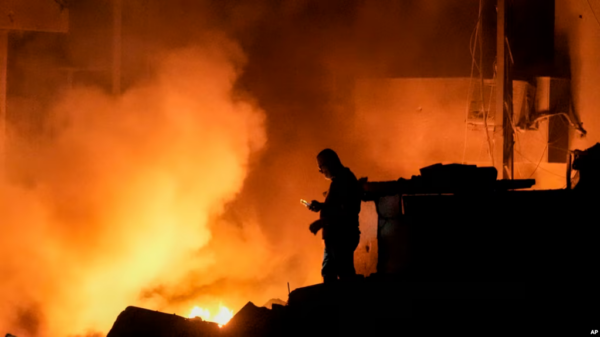Photo: Israel intensified its attacks to target Hezbollah militants in Lebanon, hitting a densely populated neighborhood in Beirut last Thursday after days of launching airstrikes on the Hezbollah-controlled southern suburbs of the Lebanese capital.( October 10, 2024)
The United States opposes the bombing campaign that Israel has carried out in Beirut in past weeks and has communicated its concerns particularly over the civilian death toll, U.S. State Department spokesperson Matthew Miller said on Tuesday.
“There are specific strikes that it would be appropriate for Israel to carry out. But when it comes to the scope and nature of the bombing campaign that we saw in Beirut for the past few weeks, it’s something that we made clear to the government of Israel we had concerns with and we were opposed to,” Miller said.
The civilian death toll was among Washington’s concerns, he said, without elaborating.
Miller’s comments represent a harsher tone than Washington has adopted so far toward Israel’s military operations in Lebanon, which Israel says are aimed at degrading Iran-aligned Hezbollah and pushing its forces north and away from the border.
Israel dramatically escalated its bombing campaign of Lebanon in recent weeks, hitting Hezbollah’s strongholds of south Lebanon, the southern suburbs of Beirut and the eastern Bekaa region. Other areas of Lebanon have also been hit.
The hostilities had been playing out along Lebanon’s southern border with Israel since October last year in parallel with Israel’s offensive in Gaza that was triggered by Hamas’ Oct. 7 attack on southern Israel.
Israeli strikes have killed at least 2,350 people over the last year, the Lebanese health ministry said, and more than 1.2 million people in Lebanon have been displaced. The majority have been killed since late September when Israel expanded its military campaign.
Miller said Washington has seen Israeli bombing of Beirut diminish in recent days, adding that the United States would continue to monitor the situation.
“We’ve seen them come down over the past few days, which is not a prediction about what will happen in the future,” he said.
Netanyahu: No ceasefire deal
In a related development Israeli Prime Minister Benjamin Netanyahu said on Tuesday he told French President Emmanuel Macron that he would not agree to a ceasefire deal that failed to stop Hezbollah rearming and regrouping.
Macron has called for a ceasefire between Israel and Iran-backed Hezbollah as well as an end to arms exports used in the Gaza Strip and Lebanon.
“The Prime Minister told President Macron that he opposes a unilateral ceasefire, which would not change the security situation in Lebanon and would return the country to its previous state,” a statement from his office said.
“He emphasized that Israel is operating against the Hezbollah terrorist organization to prevent it from threatening Israel’s citizens on the northern border and to enable them to return to their homes safely.”
On Monday, France rejected demands made by Netanyahu for a U.N. peacekeeping mission, known as UNIFIL, to pull back from its position in Lebanon, while France has summoned Israel’s ambassador over an incident where Israeli troops opened fire at three positions held by U.N. peace keepers in southern Lebanon.
Netanyahu, it said, was taken aback at President Macron’s intention to host a conference in Paris on the issue of Lebanon, with participants such as South Africa and Algeria, “which are working to deny Israel its fundamental right of self-defense and, in effect, reject its very right to exist”.
In a message to Macron, Netanyahu’s office also said in a separate statement that the State of Israel was established through “the War of Independence with the blood of our heroic fighters, many of whom were Holocaust survivors, including from the Vichy regime in France.” It added that in recent decades, the UN has approved hundreds of antisemitic resolutions against Israel.
(Reuters)


Leave a Reply
You must be logged in to post a comment.